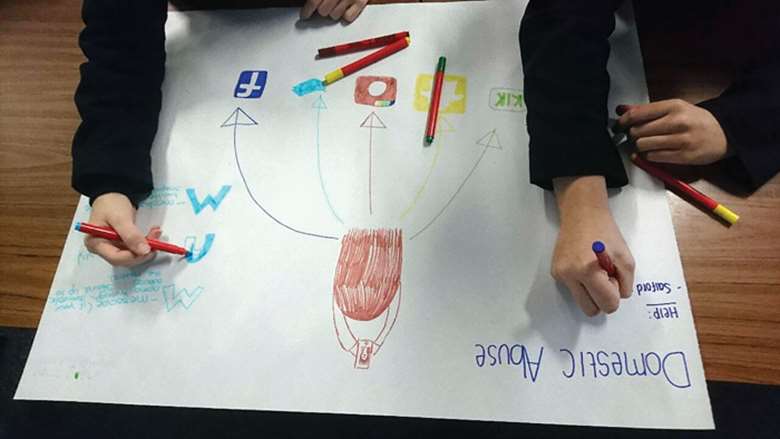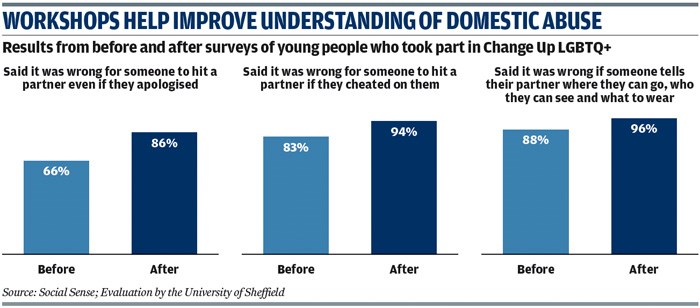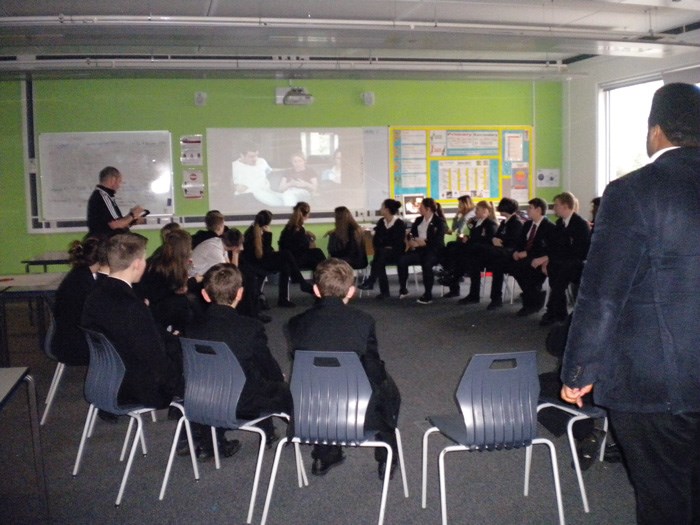Workshops on healthy LGBTQ+ relationships
Tuesday, January 28, 2020
Intervention informs LGBTQ+ young people about healthy relationships, how to recognise abusive and controlling behaviour and dispels harmful myths.

PROJECT
Change Up LGBTQ+
PURPOSE
To promote healthy relationships among LGBTQ+ young people
FUNDING
Around £10,000 from National Lottery Awards for All
BACKGROUND
In 2014, Salford Clinical Commissioning Group commissioned social marketing organisation Social Sense to deliver Change Up, a pilot project aimed at promoting healthy relationships among young people. As the project progressed it became clear LGBTQ+ (lesbian, gay, bisexual, transgender and queer or questioning and others) young people were missing out when it came to work around domestic violence and abuse. Social Sense decided to launch Change Up LGBTQ+ to fill this gap. The project was designed by Social Sense with input from the Proud Trust, the LGBT Foundation, Salford Youth Services and the University of Sheffield.
ACTION
The scheme set out to help LGBTQ+ young people better identify a “healthy relationship” and dispel harmful myths surrounding LGBTQ+ relationships. Other aims included increasing recognition of abuse and encouraging young people to report abuse and seek help.
While heterosexual and LGBTQ+ people might experience similar patterns of domestic violence and abuse, there are some differences. For example, LGBTQ+ domestic violence and abuse can include threats of outing to family, friends or officials. There are also trans-specific forms of abuse such as withholding medication.
A Social Sense lead practitioner, himself from the LGBTQ+ community, worked alongside youth workers at the clubs the young people attended to deliver the intervention. At the start of the project, 72 LGBTQ+ young people attending eight youth clubs across Salford filled in a survey, which aimed to find out what they thought was normal when it came to relationships, abuse and control. Some of the groups took place in schools and some were based in youth clubs. Young people ranged in age from 11 to 25, with the majority – 30 per cent – aged 16 and 17. When asked if their gender identity was the same as that ascribed at birth, 51 per cent said no and 49 per cent said yes. In all, 21 per cent said they were bisexual, 18 per cent pansexual (meaning gender and sex is not a factor in whether or not they are attracted to someone), 15 per cent said they were lesbians and 14 per cent said they were gay. Eleven per cent said they were questioning their sexuality, 10 per cent said they were queer, seven per cent heterosexual and four per cent asexual.
The young people were presented with a number of scenarios, such as a young man asking his partner not to see friends any more, or a young woman hitting her partner but then apologising, and asked if they thought these were wrong.
A Social Sense practitioner then delivered workshops presenting the findings of the survey to the young people and encouraging them to discuss the issues raised. “The intervention focused on what a healthy relationship is, and what the perceived norms are,” explains Ross McCooey, senior projects manager at Social Sense.
The groups also discussed ways to educate and support LGBTQ+ young people around what healthy relationships look like. They talked about the best ways of reaching their peers, and designed posters, with the winning poster displayed in youth clubs across the area. “We will refresh those posters every three to six months to keep that message relevant,” says McCooey. Finally the young people filled out a second survey, to track any changes in thought and behaviour.
When delivering Change Up LGBTQ+, Social Sense had to tread carefully around the issue of parental consent. “When we are working with young people we always send out a letter for parents saying this is what the project will be and ask for their consent,” says McCooey. Some young people taking part in the project had not yet disclosed their sexuality to their parents. Social Sense practitioners had to work with the youth workers, who already had a relationship with the young people, to approach parental consent in a tactful way. “Some young people did come out to their parents during or after the project,” says McCooey. “We had feedback saying their relationship with their parents had improved off the back of that, as the information and support had allowed them to be more open about their sexuality.”

OUTCOME
During the programme, eight young people disclosed they had experienced or were experiencing domestic abuse or violence, and were able to access support if they were not already doing so.
The initial survey was completed by 72 young people while 55 filled in the follow-up survey. The repeat survey showed many young people were better able to recognise controlling behaviour in relationships after taking part in the workshops. For example, when asked about a scenario where a young man tells his boyfriend not to go out with his friends because he thinks they are no good, only a third – 33 per cent – of respondents thought this was wrong. After the intervention, this rose to 67 per cent. When asked whether it was wrong for a girl to hit her partner if she says sorry afterwards, 66 per cent said that it was in the baseline survey, rising to 86 per cent in the follow-up survey.
The percentage who felt it was wrong for someone to hit a partner if they cheated on them increased from 83 per cent to 94 per cent, while the percentage who said it was wrong if someone told their partner where they could go, who they could see and what to wear increased from 88 per cent to 96 per cent.
WHAT’S NEXT?
Social Sense is seeking funding to replicate the Change Up LGBTQ+ programme in other parts of the country. An evaluation by the University of Sheffield made some recommendations which the organisation is looking to incorporate in future work. For example, while young people said they enjoyed the workshops and found them good and informative, they found the groups too big and noisy for such a sensitive topic. “We are also looking at making the workshops more activity-based in response to feedback,” says McCooey.

EXPERIENCE
YOUTH-LED SESSIONS ON COPING WITH RELATIONSHIP CHALLENGES
Lauren Jackson*, aged 18, attends an LGBTQ+ youth group in Manchester, run by youth worker Camille Jordan. “It is a very youth-led group,” says Jordan.
When Social Sense presented the statistics from the initial survey of young people, showing how they felt about various aspects of domestic violence in LGBTQ+ relationships, many young members were “ very shocked”, explains Jordan. “Lauren shared that she had been in an emotionally abusive same-sex relationship in the past. The information she had been given during the session made her realise the relationship was perhaps not what she had thought it was, and that abuse was not just a physical thing. For example, one of the main things was talking about when someone controls who their partner is allowed to see – why aren’t they allowed to be friends with their exes, it should be okay, why should their partner control who they see?”
The Change Up sessions gave Lauren more of an insight into how to cope with different things that might happen in relationships in the future, says Jordan. “It felt like Lauren and a lot of the young people had more tools to deal with abusive scenarios when they take place in the future,” she explains.
While Lauren and her peers felt the sessions were useful, they also felt some of the questions in the survey could have been improved. “The way some of the questions were worded made it difficult for young people to understand,” says Jordan. “They felt the questions were not young people friendly or very clear in terms of what they were asking. The project then addressed this and they were very pleased, they felt they had contributed.”
*Name changed
- If you think your project is worthy of inclusion, email supporting data to derren.hayes@markallengroup.com




